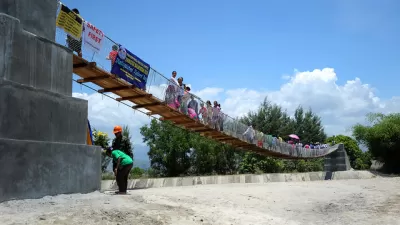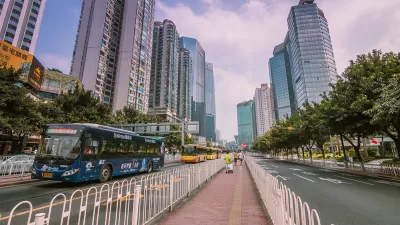The nation of Iraq is building itself anew after the last of the US troops evacuated six months ago, but experts are saying that their wealth, which has created an invasion of shopping malls around the country, is subsidizing the public agenda.
Oil production has given the country a surplus of wealth, but the country's private sector continues to suffer from malnourishment. Instead of financing new businesses and supporting the build-out of a private sector, which is virtually non-existent in the country, the accumulation of wealth has been given the task of financing the government work force, which currently employs about one-third of the nation's population. Another beneficiary of this increased revenue? Super malls. "'Basically, Iraq is trying to build a consumer society, not on state capitalism like in China, but on socialism,' said Marie-Hélène Bricknell, the World Bank's representative in Iraq."
"Given the statist mentality of most top Iraqi officials and widespread corruption," writes Arango, "diplomats are generally pessimistic that the expected boom in government revenues will be used either to help develop a private sector or to pay for an ambitious public works program - something the country, where 40 percent of the population still lacks access to safe drinking water, desperately needs. Instead, experts worry it will finance more of what Iraq already has: corruption and a huge government work force."
This increasingly skewed spread of wealth essentially robs the nation from the ability to support itself, by not providing basic needs and services or nourishing a self-sustaining working class. "Building a consumer society on top of nothing is like building a bubble that will burst in the future," Ms. Bricknell said. With the shopping malls, she said, "you are putting a veneer over a rotting core, basically."
Arango, sensing a storm brewing ahead, is not optimistic for future conditions in Iraq, and claims that history may be repeating itself. "In 'The Modern History of Iraq,' he writes, "the American historian Phebe Marr described a similar trajectory in the 1970s when, she wrote, 'the era of prosperity rapidly created a consumer society dependent on government employment.'"
FULL STORY: Oil Wealth Returning, Iraq Sees Malls Rise

Maui's Vacation Rental Debate Turns Ugly
Verbal attacks, misinformation campaigns and fistfights plague a high-stakes debate to convert thousands of vacation rentals into long-term housing.

Planetizen Federal Action Tracker
A weekly monitor of how Trump’s orders and actions are impacting planners and planning in America.

San Francisco Suspends Traffic Calming Amidst Record Deaths
Citing “a challenging fiscal landscape,” the city will cease the program on the heels of 42 traffic deaths, including 24 pedestrians.

Study: Anti-Homelessness Laws Don’t Work
Research shows that punitive measures that criminalized unhoused people don’t help reduce homelessness.

In U.S., Urban Gondolas Face Uphill Battle
Cities in Latin America and Europe have embraced aerial transitways — AKA gondolas — as sustainable, convenient urban transport, especially in tricky geographies. American cities have yet to catch up.

Detroit Says Problems With Property Tax Assessments are Fixed. Advocates Disagree.
With higher-valued properties under assessed and lower-valued properties over assessed, advocates say there's still a problem with Detroit's property tax system.
Urban Design for Planners 1: Software Tools
This six-course series explores essential urban design concepts using open source software and equips planners with the tools they need to participate fully in the urban design process.
Planning for Universal Design
Learn the tools for implementing Universal Design in planning regulations.
Heyer Gruel & Associates PA
JM Goldson LLC
Custer County Colorado
City of Camden Redevelopment Agency
City of Astoria
Transportation Research & Education Center (TREC) at Portland State University
Jefferson Parish Government
Camden Redevelopment Agency
City of Claremont





























